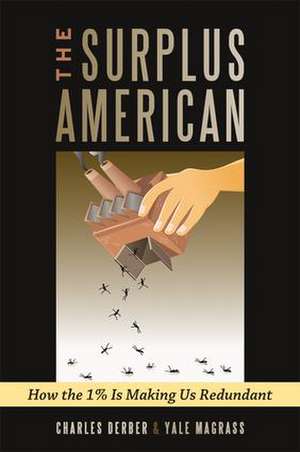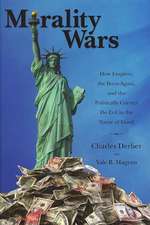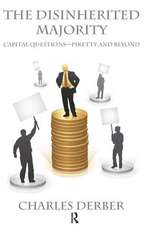Surplus American: How the 1% is Making Us Redundant
Autor Charles Derber, Yale R. Magrassen Limba Engleză Hardback – 30 sep 2012
| Toate formatele și edițiile | Preț | Express |
|---|---|---|
| Paperback (1) | 164.37 lei 6-8 săpt. | |
| Taylor & Francis – 30 sep 2012 | 164.37 lei 6-8 săpt. | |
| Hardback (1) | 931.20 lei 6-8 săpt. | |
| Taylor & Francis – 30 sep 2012 | 931.20 lei 6-8 săpt. |
Preț: 931.20 lei
Preț vechi: 1253.49 lei
-26% Nou
Puncte Express: 1397
Preț estimativ în valută:
178.18€ • 186.54$ • 147.44£
178.18€ • 186.54$ • 147.44£
Carte tipărită la comandă
Livrare economică 05-19 aprilie
Preluare comenzi: 021 569.72.76
Specificații
ISBN-13: 9781612052496
ISBN-10: 1612052495
Pagini: 176
Dimensiuni: 152 x 229 x 23 mm
Greutate: 0.45 kg
Ediția:1
Editura: Taylor & Francis
Colecția Routledge
Locul publicării:Oxford, United Kingdom
ISBN-10: 1612052495
Pagini: 176
Dimensiuni: 152 x 229 x 23 mm
Greutate: 0.45 kg
Ediția:1
Editura: Taylor & Francis
Colecția Routledge
Locul publicării:Oxford, United Kingdom
Recenzii
”A lucid and informative analysis of how our increasingly dysfunctional socioeconomic system is intensifying the process of turning America into a land of surplus people, decaying infrastructure, and shredded formal democracy—and of what we can do about it”
—Noam Chomsky
“Derber and Magrass’s crisp book dramatizes the powerful forces undermining job security and rendering most of us surplus, not just economically but in almost every way. An essential read for anyone who wants to understand the history and future of work, politics, and social movements in America—with a hopeful roadmap to creating an economy and a society that work for everyone.”
—Chuck Collins, Institute for Policy studies, and author of 99 to 1: How Wealth Inequality is Wrecking the World and What We Can Do About It
“This is a wonderfully imaginative but disturbing prophecy of where corporate outsourcing of American jobs—and other, often hidden trends in government policies for education, youth, the elderly, the military, and the imprisoned—could lead by 2020. The dystopia which they outline—in the book and in its concluding play—is all too believable unless American’s adopt the new forms of democratic resistance that their encouraging final chapters advocate.”
—Jonathan Steele, International affairs columnist for the Guardian
“Derber and Magrass have produced a double-header for the agitating mind—a people’s history and a people’s theatre. For action, you take it from there, where you live.”
—Ralph Nader
“Written in a very accessible style, the book elicits both lay and professional readers’ curiosity, and leaves a decided impression that the author is an engaging, insightful teacher well worth talking to. Highly recommended.”
—Choice
“Derber and Magrass have done a masterful job in explaining the major issues of political economy facing us today. The analysis is complemented brilliantly with a play, ready to be acted out in classrooms, religious groups, and book groups, to better help illustrate the absurd tragedy of the masses of people being cast aside and to show how America’s majority can band together to reclaim our democracy.”
—Jonathan White, co-author of The Engaged Sociologist and of Sociologists in Action
—Noam Chomsky
“Derber and Magrass’s crisp book dramatizes the powerful forces undermining job security and rendering most of us surplus, not just economically but in almost every way. An essential read for anyone who wants to understand the history and future of work, politics, and social movements in America—with a hopeful roadmap to creating an economy and a society that work for everyone.”
—Chuck Collins, Institute for Policy studies, and author of 99 to 1: How Wealth Inequality is Wrecking the World and What We Can Do About It
“This is a wonderfully imaginative but disturbing prophecy of where corporate outsourcing of American jobs—and other, often hidden trends in government policies for education, youth, the elderly, the military, and the imprisoned—could lead by 2020. The dystopia which they outline—in the book and in its concluding play—is all too believable unless American’s adopt the new forms of democratic resistance that their encouraging final chapters advocate.”
—Jonathan Steele, International affairs columnist for the Guardian
“Derber and Magrass have produced a double-header for the agitating mind—a people’s history and a people’s theatre. For action, you take it from there, where you live.”
—Ralph Nader
“Written in a very accessible style, the book elicits both lay and professional readers’ curiosity, and leaves a decided impression that the author is an engaging, insightful teacher well worth talking to. Highly recommended.”
—Choice
“Derber and Magrass have done a masterful job in explaining the major issues of political economy facing us today. The analysis is complemented brilliantly with a play, ready to be acted out in classrooms, religious groups, and book groups, to better help illustrate the absurd tragedy of the masses of people being cast aside and to show how America’s majority can band together to reclaim our democracy.”
—Jonathan White, co-author of The Engaged Sociologist and of Sociologists in Action
Cuprins
Part I You’re Fired; Chapter 1 Americans as a Surplus People; Chapter 2 Who Are the Surplus People?; Chapter 3 How to Make Money from the Creation of Surplus People; Chapter 4 The Four Roots of Surplus People Production; Chapter 5 How Many Surplus People Are There in the United States?; Chapter 6 Introducing the History of Surplus People; Chapter 7 How Capitalism Created Surplus People Right from the Very Beginning; Chapter 8 How the First Truly Industrial Society, Britain, Used Surplus People; Chapter 9 How American Capitalists Controlled the Surplus Population before World War I; Chapter 10 World War I and the Roaring Twenties; Chapter 11 The Great Depression Begins; Chapter 12 Roosevelt, Keynes, and the New Deal; Chapter 13 America at Its Height; Chapter 14 America Enters Decline; Chapter 15 The Age of Reagan; Chapter 16 Does Our Theory Hold Up?; Chapter 17 What to Do? The Tea Party and the Occupy Movement; Chapter 18 The Tea Party and the Dangerous Politics of Reaction; Chapter 19 The Occupy Movement and the Politics of Hope; Chapter 20 The Past and Future of the Occupy Movement; Chapter 21 Why a Play Is an Effective Way to Discuss Politics and EconomicspartII I Like Firing People, Charles Derber, Yale Magrass]partIII I Like Firing People: A Version Performed at Boston College, Charles Derber, Yale Magrass;
Descriere
The Surplus American considers a future where increasing numbers of Americans will be rendered jobless and redundant






